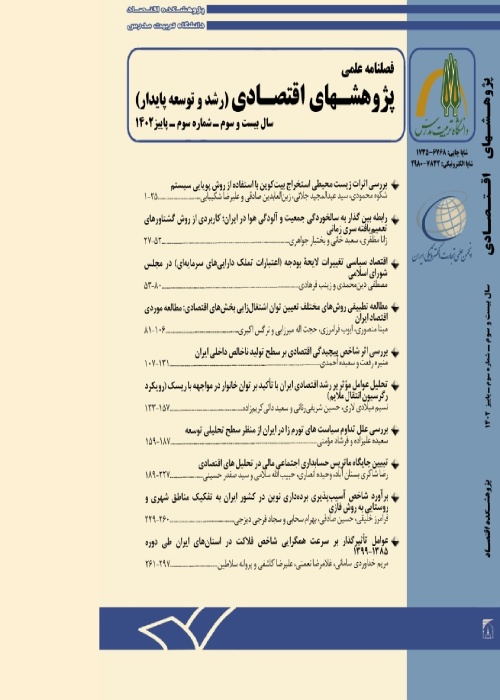Investigating the Effects of Energy Subsidies on Achieving Sustainable Development using Multiple Attribute Decision Making (MADM) Models and TOPSIS & VIKOR Evaluation Methods - Case Study of Iran, China, India, Saudi Arabia, Russia, Germany, USA and Japan
Considering the international policy towards sustainable development and conflict of the energy subsidy with the SDG, the present study examines the effects of subsidy on the realization of sustainable development in the selected countries. For this purpose, by designing and constructing a Composite Indicator (CI) for sustainable development, the performance of the top five countries in the world in terms of paying the most energy subsidies (first group), is compared with the performance of the world's large economies in terms of the highest rate of GDP (second group, mainly without paying energy subsidies). The hypotheses of the research are: 1) there is a negative relationship between the rankings of countries in terms of the largest energy subsidies with the ranking based on the realization of sustainable development. 2) the countries of the second group (with the lowest energy subsidies) have on average a better situation in achieving sustainable development compared to the countries of the first group. 3) among the countries of the second group, China has the least realization in sustainable development by paying significant energy subsidies.
In the present study, the composite index of sustainable development is investigated using 12 variables in the form of three economic, social and environmental dimensions and based on the design of Multiple Attribute Decision Making (MADM). The targeted CI is calculated using seven approaches: Z-Score, Max-Min, McGranahan, Experts’ Judgements Scoring, Guttman, TOPSIS and VIKOR, for selected countries over the period of 1990-2020, and the results are presented and compared at static and dynamic levels. To weight the variables, the same weighting technique, McGranahan, EJ scoring, Guttman and CRITIC (Criteria Importance Through Intercriteria Correlation) are used in the calculations.
The results of the study indicate the unfavorable situation of Iran in paying energy subsidies (ranked first in the world) and the realization of sustainable development (ranked last among the countries surveyed); Germany, on the other hand, ranks first in the study without paying energy subsidies. Ranking countries at the dynamic level, while eliminating the existing problems at the static level, indicates a strong negative relationship between paying energy subsidies and achieving sustainable development. This confirms the first hypothesis of the research. In this regard, the correlation between the average energy subsidy and SDIMax-Min has been increased to -0.74 and the ranked correlation between SDIMax-Min and subsidy payment has been improved to -0.85. On the other hand, the average values of sustainable development indicators, with the change of study approach and weighting techniques, have had similar and stable results, which all indicate that the ranking of countries in different situations has become more realistic in the dynamic level compared to the static level. Also, the comparison of the average sustainable development realization in the first and second groups, shows that in terms of quantity and rank, the countries of the second group have a significant advantage over the first group, which means confirming the second hypothesis. And finally, in the ranking based on 7 approaches, China is ranked 4th after Germany, America and Japan in 6 approaches, which means confirming the third hypothesis. The results of sensitivity analysis indicate the high share of life expectancy, per capita income and education index in the targeted CI.
Regarding some minor differences in the results of the seven approaches, using De Montis et al. (2021)'s experience based on calculating the average ranks and Miç & Figen Antmen (2021)'s experience based on setting the criterion of the highest repetition of the rank in different approaches, all hypotheses are confirmed and the ranking of the countries does not change. Also, if we perform a sensitivity analysis on the approaches, there will be no change in the final ranking result. The main suggestion derived from the results of the research is the necessity of planning to eliminate energy subsidies in the country in accordance with international policies from 2015. However, according to Mohammadipour et al. (2022), the removal of energy subsidies and the modification of the energy carriers’ prices creates very extensive and lasting (long-term) destructive effects on macroeconomic variables. On the other hand, according to Taylor (2020), based on the REmap (Renewable Energy roadmap analysis) by IRENA (International Renewable Energy Agency), firstly, policy development in the direction of renewable energy, nuclear, etc., and planning to reduce fossil fuel subsidies have been identified in the form of two axes (until 2030 and until 2050). And secondly, a special path has been drawn to manage and move from harmful subsidies to the environment and sustainable development to environmentally friendly subsidies until 2050. Therefore, considering the destructive effects of energy subsidies, it is suggested that all reforms and removal of energy subsidies should be carried out in the form of a comprehensive, regulated, gradual program with a strong redistributive role of the government. Secondly, all these actions should be done in line with the global planning and policy and taking into account the REmap. Also, the research results of the study suggest that in the design of MADM models, when the data are of the time series type, Z-Score, Max-Min, McGranahan, Experts’ Judgements Scoring and Guttman approaches perform better (and more recommended) by replacing the opposite variable for each time series data. However, when the data are not in the time series form, the performance of TOPSIS and VIKOR approaches are optimal (and more recommended) by simplifying complex relationships.
- حق عضویت دریافتی صرف حمایت از نشریات عضو و نگهداری، تکمیل و توسعه مگیران میشود.
- پرداخت حق اشتراک و دانلود مقالات اجازه بازنشر آن در سایر رسانههای چاپی و دیجیتال را به کاربر نمیدهد.



